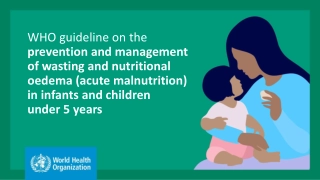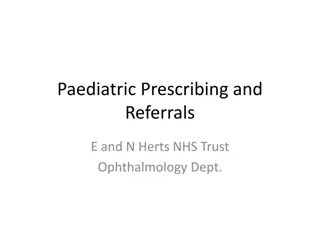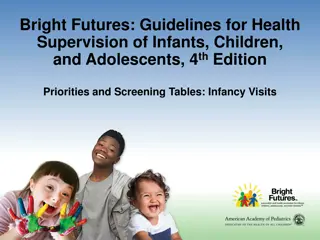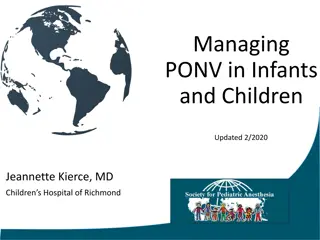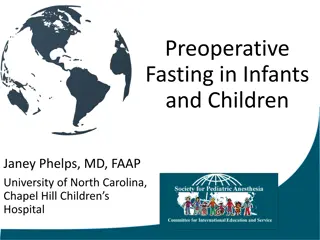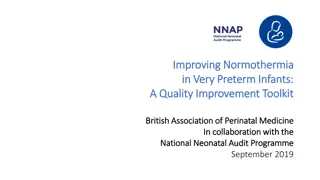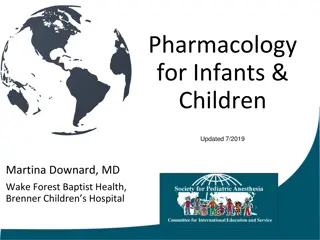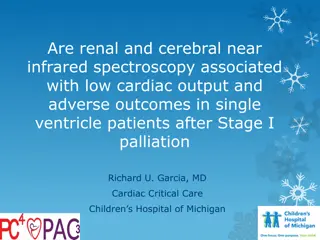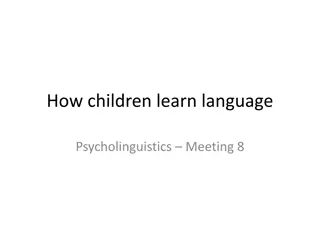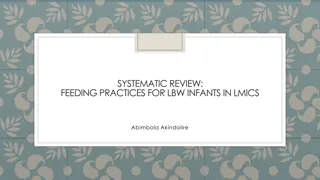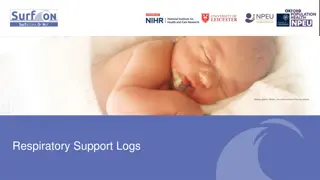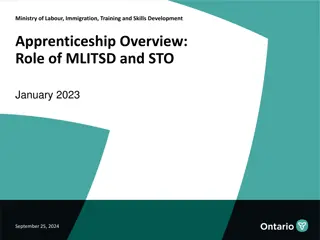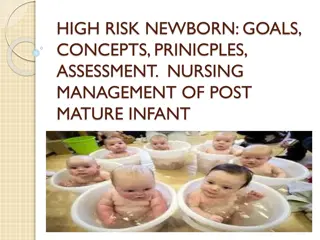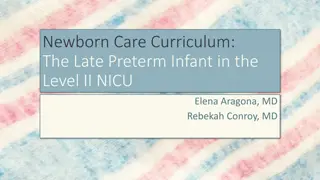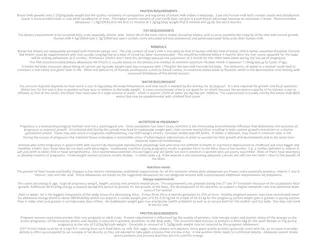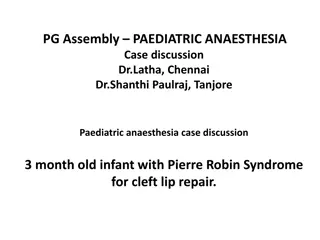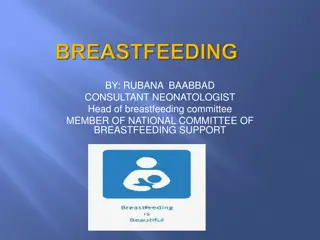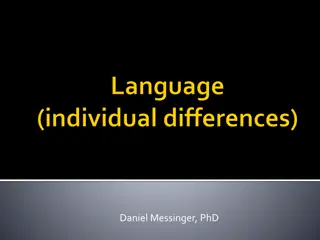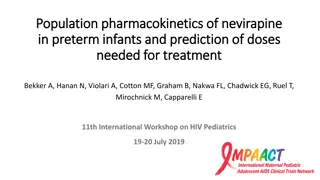WHO Guideline: Prevention & Management of Malnutrition in Infants & Children
Key insights from WHO's guideline on managing wasting and malnutrition in children under 5. Covers assessment, care for infants and mothers, and treatment strategies for different malnutrition levels
3 views • 37 slides
Managing Cows Milk Protein Allergy (CMPA) in Infants: Weaning and Reintroduction Guidelines
Cows Milk Protein Allergy (CMPA) in infants can present various symptoms and challenges. This guide covers the diagnosis, symptoms, weaning strategies, reintroduction of dairy, alternative products, and meeting nutritional needs. Learn to differentiate between CMPA and lactose intolerance for proper
1 views • 31 slides
Children's and Mothers' Health Trends in Northern Ireland 2021/22
Children's health in Northern Ireland showed various trends in 2021/22, including a high rate of infants born by Caesarean section, percentages of pre-term births, multiple births, infants breastfed, low and high birth weights, and overweight and obese children. Mothers' summary in 2020/21 indicated
1 views • 23 slides
Post Matric Scholarship for OBC Students – Puducherry
How to get Post Matric Scholarship for Obc in Puducherry\n\nThe Post Matric Scholarship for OBC Students in Puducherry for the academic year, offered by the Ministry of Social Justice & Empowerment, Government of India, is an opportunity for students in the OBC category to pursue post-matric educati
1 views • 5 slides
Newborn Screening Market Share to be Worth $2.69 Billion by 2031
Newborn screening is a screening program for infants under which pre-symptomatic congenital conditions are detected so that treatment can be commenced as soon as possible to prevent or reduce the long-term consequences of the disease. These programs are usually run by the national or state governing
0 views • 3 slides
Beginning Junior Infants
Welcome to the exciting journey of Junior Infants! Get essential tips on preparing your child for school, including advice on school uniform, lunchtime, and the curriculum. Discover how to support your child's early education effectively.
0 views • 15 slides
Spectacle Prescribing Guidelines for Infants and Children
This paper explores guidelines for prescribing spectacles to infants and children, focusing on considerations such as refractive errors, normal visual development, and the impact of spectacles on visual function and emmetropisation. It discusses refractive errors and astigmatism prevalence from birt
0 views • 34 slides
Bright Futures: Guidelines for Health Supervision of Infants, Children, and Adolescents
This content provides a comprehensive guide for health supervision of infants, children, and adolescents based on Bright Futures guidelines. It includes priorities and screening tables for various visits from newborn to 9 months, offering valuable insights into the developmental stages and health mo
0 views • 16 slides
Managing Postoperative Nausea and Vomiting in Infants and Children
Postoperative nausea and vomiting (PONV) is a significant concern in pediatric patients due to their increased risk compared to adults. This presentation by Dr. Jeannette Kierce covers the pathophysiology, risk factors, prophylaxis, and rescue treatments for PONV in infants and children, emphasizing
0 views • 34 slides
Understanding Hypotonia in Infants: Causes, Evaluation, and Management
Hypotonia, which is reduced muscle tone, can present challenges in infants affecting their motor skills and posture. This article explores the definitions, physiology, differences in central and peripheral causes, evaluation methods, and management options for hypotonia. It discusses relevant termin
0 views • 40 slides
Preoperative Fasting in Infants and Children: Guidelines and History
Explore the evolution and rationale behind preoperative fasting guidelines in infants and children, including historical cases of aspiration during anesthesia. Learn about Mendelson Syndrome, recommendations for aspiration prevention, and the development of NPO orders over the years. Discover the im
0 views • 26 slides
Understanding Cortical Visual Impairment in Infants
Cortical Visual Impairment (CVI) is a condition resulting from retrogeniculate brain damage that affects visual processing in infants. Commonly observed in premature infants, CVI can manifest as atypical behaviors like staring at lights, optic atrophy, and nystagmus. The causes range from structural
2 views • 23 slides
Quality Improvement Toolkit for Improving Normothermia in Very Preterm Infants
This resource provides a comprehensive toolkit developed by the British Association of Perinatal Medicine in collaboration with the National Neonatal Audit Programme to assist clinicians in neonatal units in delivering normothermia to very preterm infants. It includes evidence-based interventions, d
1 views • 17 slides
Pediatric Pharmacology Update: Perioperative Medications in Infants and Children
Gain insights on frequently used medications in the perioperative period for infants and children, including anesthesia medications. Explore pharmacokinetics, drug distribution in neonates, and the effects of common anesthesia agents on pediatric patients. Understand how immature kidney or liver fun
0 views • 43 slides
Association of Renal and Cerebral Near Infrared Spectroscopy with Low Cardiac Output in Single Ventricle Patients
Near-infrared spectroscopy (NIRS) has been studied in infants after Stage I palliation surgery to assess its association with low cardiac output and adverse outcomes. This retrospective study investigated postoperative cerebral and renal NIRS values in infants with single ventricle physiology. Resul
0 views • 13 slides
Detection of Low-Grade Hemorrhages in Preterm Infants: Ultrasounds vs. MRIs
This study compares the effectiveness of head ultrasounds and brain MRIs in detecting low-grade hemorrhages in preterm infants. It discusses the incidence of intraventricular hemorrhage (IVH) in very low birth weight infants, classification of IVH, risk factors for IVH, outcomes related to IVH grade
9 views • 33 slides
The Fascinating Journey of Language Acquisition in Children
At birth, infants cannot comprehend or produce speech, but by the age of 4, they have acquired vocabulary and grammatical rules to form various sentence structures. From vocalization to babbling and then to speech, infants progress through distinct stages in language development. Understanding how i
0 views • 32 slides
Sewing Club Making Weighted Bibs for Infants at MUSC Children's Hospital
Our Buist Sewing Club, inspired by the unity during the Bosnian War, creates weighted bibs for infants at MUSC Children's Hospital. These bibs provide comfort and aid in circulation post-surgery, benefitting over 137,000 children annually. Through our diverse group, we aim to make a positive impact
0 views • 15 slides
Understanding New Jersey Mature Driver Challenges
New Jersey has a significant population of mature drivers aged 65 and older, accounting for 21% of licensed drivers. The proportion of crashes involving mature drivers has increased, with over 17% occurring in 2020. Vision, hearing, cognition, and physical condition changes with aging impact driving
0 views • 51 slides
Feeding Practices for LBW Infants in LMICs
Improved survival rates of small babies highlight the importance of nutrition for LBW infants. Research into feeding practices in LMICs is crucial for promoting growth and development. Studies compare formula milk to human milk, exploring effects on growth, development, morbidity, and mortality. Evi
0 views • 21 slides
Importance of Feeding Infants with Breast Milk and Iron-Fortified Formula
Breast milk and iron-fortified infant formula are recommended for infants to meet their nutritional needs and support optimal development. Breast milk offers numerous health benefits, protecting infants from illnesses and reducing the risk of obesity. Iron-fortified formula is a suitable alternative
0 views • 23 slides
Safeguarding Infants from Emotional Maltreatment: What Works?
Safeguarding infants from emotional maltreatment is crucial during the first two years of life. Emotional abuse, though not always accompanied by physical or sexual abuse, can have severe impacts on a child's development. The paper explores the structure, prevalence, and impact of emotional abuse on
3 views • 59 slides
Neonatal Respiratory Support Study Overview
This study focuses on evaluating the primary outcomes of length of hospital stay post-birth and incidence of severe respiratory failure in infants receiving respiratory support. Detailed logs are maintained daily until the infant is off respiratory support or discharged. The study is funded by NIHR.
0 views • 19 slides
Understanding Gametogenesis and Oogenesis Process in Humans
Gametogenesis is the formation of gametes from germ cells in the testes and ovaries, involving meiosis and cytodifferentiation. Oogenesis specifically refers to the differentiation of oogonia into mature oocytes, with prenatal oogenesis occurring before birth and postnatal oogenesis after birth. The
0 views • 17 slides
Understanding Normal Labour in Pregnancy
Labour is the natural process of expelling a mature foetus from the uterus. Criteria for normal labour include spontaneous expulsion of a single, mature foetus within a reasonable time frame without complications. Various theories explain the onset of labour, such as hormonal factors and mechanical
0 views • 35 slides
Understanding Mature Convection Distribution Over Europe
Analyzing the time and space distribution of mature convection over Europe based on MSG Airmass product from Slovak Hydrometeorological Institute. The data covers various timeframes and processing steps, highlighting the dependence on Sun elevation, daytime hours, and monthly variations. Statistical
0 views • 11 slides
Ministry of Labour, Immigration, Training, and Skills Development Apprenticeship Overview
Ministry of Labour, Immigration, Training, and Skills Development established Skilled Trades Ontario (STO) to simplify and transform the skilled trades and apprenticeship system in Ontario. The process involves three phases: STO transition, planning for a mature state, and implementation of a mature
0 views • 6 slides
Understanding Ohio Revised Code Chapter 3365: Managing Mature Subject Matter in Education
Ohio Revised Code Chapter 3365 introduces regulations regarding mature subject matter in education, requiring specific actions from colleges and secondary schools. It defines mature subject matter and outlines procedures for handling such content, including the development of permission slips and st
0 views • 21 slides
Nursing Management of High-Risk Newborns: Post-Mature Infant Focus
High-risk newborns, including post-mature infants, require specialized care due to their increased chances of morbidity. Identification, goals, assessment, nursing principles, and management strategies are crucial in providing effective care for these vulnerable neonates. Predisposing factors, clini
0 views • 17 slides
Navigating the Transition to University: Tips for Mature Students
Explore insights on transitioning from college to university as a mature student, including personal reflections, cultural and skills differences, survival tips, and future career prospects. Discover valuable advice on involving family and friends, being positive, seeking help, prioritizing life, an
0 views • 8 slides
Newborn Care Curriculum for Late Preterm Infants in Level II NICU
This curriculum module focuses on the care of late preterm infants in Level II NICU settings, covering topics such as respiratory management, feeding difficulties, hypoglycemia, hypothermia, sepsis, hyperbilirubinemia, and discharge planning. It includes learning objectives, nursery care levels, phy
1 views • 42 slides
Nutritional Requirements for Infants, Breastfeeding, and Pregnancy
Breast milk powder provides adequate protein for infants, while cow and human milk have varying qualities. Essential fatty acids are crucial for skin integrity and growth, and infants may need iron supplementation if formula-fed. Pregnancy nutrition is vital for fetal development, with deficiencies
0 views • 5 slides
Paediatric Anaesthesia Case Discussion: Challenges of Anaesthetizing an Infant with Pierre Robin Syndrome
Pierre Robin Syndrome (PRS) presents challenges in paediatric anaesthesia, especially in infants undergoing procedures like cleft lip repair. PRS is characterized by micrognathia, glossoptosis, and respiratory distress. Other syndromes associated with cleft lip include Treacher Collins syndrome, Gol
0 views • 56 slides
Innovative Solutions for Mature Oil and Gas Fields Powered by Poseidon Technology
Poseidon, a leap energy technology platform, offers modules designed for complex, high well count mature oil and gas fields. Its LTRO workflow provides a cost-effective solution for identifying remaining oil in wells with long production histories and multiple zones. By using compliant mapping metho
0 views • 31 slides
Overview of Pulmonary Hemorrhage in Infants
Pulmonary hemorrhage in infants is a severe condition characterized by bloody discharge from the upper respiratory tract or endotracheal tube, often associated with prematurity, lung complications, infections, or trauma. The etiology, pathophysiology, clinical manifestations, and diagnosis of pulmon
0 views • 14 slides
The Importance of Breastfeeding for Infants and Mothers
Breastfeeding is crucial for infants as it provides over 200 components essential for growth and development. It offers numerous health benefits, helps in postpartum recovery, reduces the risk of various diseases, and promotes bonding between mother and child. For mothers, breastfeeding aids in weig
0 views • 18 slides
Comprehensive Care for HIV-Exposed Infants Training Curriculum
Explore the comprehensive care training curriculum for healthcare providers focusing on key components of caring for HIV-exposed infants. Learn about administering ARV prophylaxis, recognizing HIV infection symptoms, and ensuring maternal health. Discover initiatives to expand and improve HIV testin
0 views • 63 slides
Nutritional Treatment Guidelines for Infants Less Than 6 Months
This content provides valuable information on the nutritional treatment of infants less than 6 months old, focusing on the preference order of milks for treatment, preparation methods, administration guidelines based on weight and treatment stage, considerations for follow-up, and the importance of
0 views • 10 slides
Language Development in Infants: Insights from Dr. Daniel Messinger, PhD
Dr. Daniel Messinger, PhD, discusses the early language development of infants, highlighting their ability to perceive phonetic differences and the influence of linguistic environments. The development process involves permanent changes, including speech categorization by 8 months congruent with the
0 views • 39 slides
Population Pharmacokinetics of Nevirapine in Preterm Infants
Population pharmacokinetics of nevirapine in preterm infants were evaluated to predict the doses needed for treatment. Early antiretroviral treatment recommendations for neonates, challenges with available ARV formulations, and the importance of data to inform nevirapine dosing in preterm infants we
1 views • 17 slides
